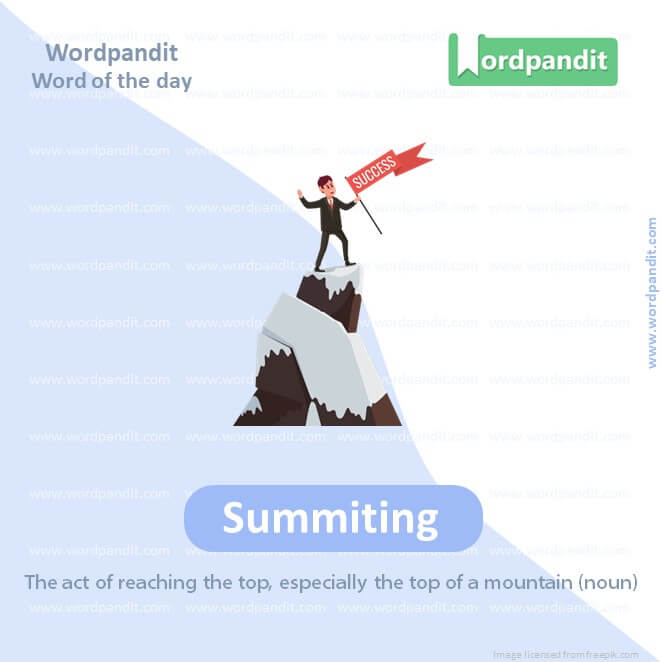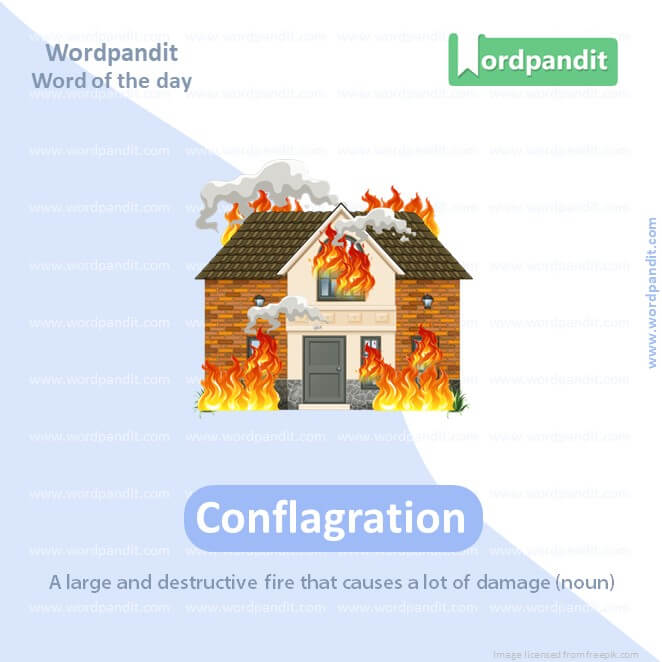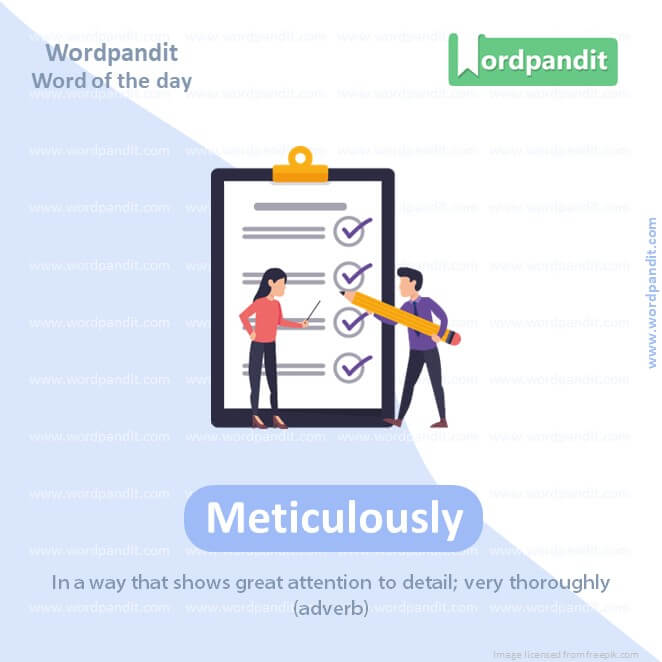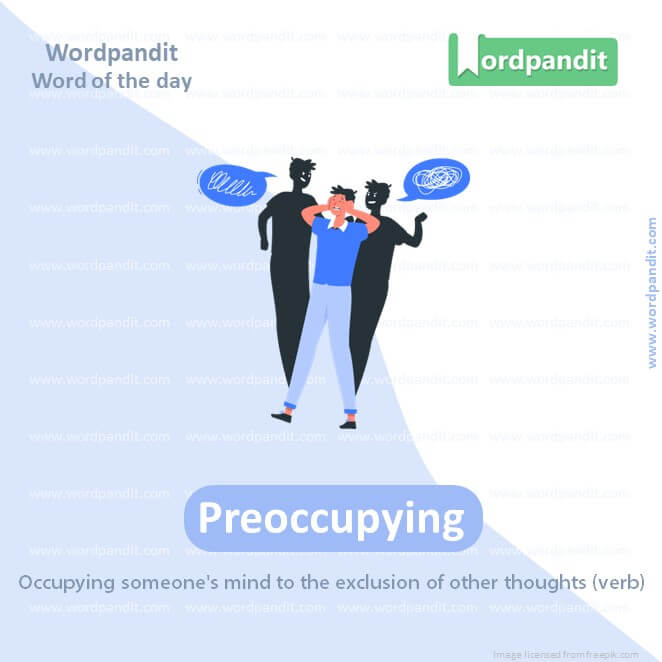Daily Vocabulary Words: List of Daily Used Words in Leading International Newspapers
Hi there. Welcome to this special section @ Wordpandit.
Our endeavour here is very simple: to highlight important daily vocabulary words, which you would come across in leading newspapers in the country. We have included the following newspapers in our selection:
• The New York Times
• The Washington Post
• Scientific American
• BBC
• The Guardian
• Psychology Today
• Wall Street Journal
• The Economist
We are putting in extensive work for developing your vocabulary. All you have got to do is be regular with this section and check out this post on a daily basis. This is your repository of words that are commonly used and essentially, we are posting a list of daily used words. Hence, this has significant practical application as it teaches you words that are used commonly in leading publications mentioned above.
Visit the website daily to learn words from leading international newspapers.

WORD-1: Summiting
CONTEXT: Teams reporting higher feelings of group belonging repeatedly outperform other teams because their members share more of their unique information about summiting Everest.
SOURCE: (Not provided)
EXPLANATORY PARAGRAPH: Imagine climbing to the very top of a tall mountain and looking down at the world below. That’s like “summiting.” It means reaching the highest point of something, like standing on the highest peak of a mountain after a long and challenging climb.
MEANING: The act of reaching the top, especially the top of a mountain (noun)
PRONUNCIATION: SUHM-it-ing
SYNONYMS: reaching the summit, scaling, conquering, cresting, topping, reaching the peak
USAGE EXAMPLES:
1. After weeks of climbing, they finally succeeded in summiting Mount Everest.
2. Summiting the mountain was a challenging but rewarding experience.
3. The team celebrated after summiting the highest peak in the range.
4. She dreamed of one day summiting all Seven Summits.

WORD-2: Conflagration
CONTEXT: the Houthis in Yemen this month, fears of a larger regional conflagration are steadily growing.
SOURCE: (Not provided)
EXPLANATORY PARAGRAPH: Imagine watching a fire spread quickly through a forest, turning trees into burning torches. That’s like a “conflagration.” It refers to a large and destructive fire that spreads rapidly and causes widespread damage, like a wildfire raging out of control or a building engulfed in flames.
MEANING: A large and destructive fire that scauses a lot of damage (noun).
PRONUNCIATION: kuhn-fluh-GREY-shuhn
SYNONYMS: blaze, inferno, firestorm, holocaust, wildfire, devastation
USAGE EXAMPLES:
1. The city was devastated by a conflagration that destroyed several buildings.
2. The firefighters struggled to contain the conflagration as it spread through the forest.
3. A conflagration broke out in the warehouse, causing extensive damage.
4. The conflagration left behind a trail of destruction in its wake.

WORD-3: Meticulously
CONTEXT: They have said as much publicly, and perhaps more important, they have meticulously avoided taking direct military action against either Israel or the United States
SOURCE: (Not provided)
EXPLANATORY PARAGRAPH: Imagine trying to put together a puzzle with hundreds of tiny pieces, making sure each one fits perfectly. That’s like doing something “meticulously.” It means doing something very carefully and paying close attention to detail, like cleaning your room so every corner is spotless or writing your name neatly on a test paper.
MEANING: in away that shows great attention to detail; very thoroughly (adverb).
PRONUNCIATION: muh-TIK-yuh-luhs-lee
SYNONYMS: carefully, precisely, thoroughly, attentively, scrupulously, methodically
USAGE EXAMPLES:
1. She meticulously planned every aspect of her wedding.
2. The artist meticulously painted each stroke of the masterpiece.
3. He meticulously followed the recipe to ensure the dish turned out perfectly.
4. The detective meticulously examined the crime scene for clues.

WORD-4: Retaliating
CONTEXT: The groups they back are fighting Iran’s foes and so far, neither Israel nor the United States has signaled any interest in retaliating directly.
SOURCE: (Not provided)
EXPLANATORY PARAGRAPH: Imagine someone pushing you and then you pushing them back to show them you won’t let them bully you. That’s like “retaliating.” It means responding to an attack or insult with a similar action, like hitting someone who hit you first or saying something mean to someone who insulted you.
MEANING: to do something harmful or unpleasant to someone because they have done something harmful or unpleasant to you (verb).
PRONUNCIATION: ri-TAL-ee-eyt-ing
SYNONYMS: striking back, responding, reacting, avenging, counterattacking, revengeful
USAGE EXAMPLES:
1. The country vowed to retaliate against any act of aggression.
2. She retaliated against her bullies by standing up for herself.
3. The team retaliated with a swift counterattack after conceding a goal.
4. He retaliated with a scathing remark after being insulted.

WORD-5: Preoccupying
CONTEXT: At the heart of Iran’s aversion to a major conflict are the domestic issues that have been preoccupying the regime.
SOURCE: (Not provided)
EXPLANATORY PARAGRAPH: Imagine having a big test coming up and worrying about it all day, even when you’re playing with your friends. That’s like something being “preoccupying.” It means taking up most of your thoughts or attention, like feeling stressed about an upcoming event or constantly thinking about something important.
MEANING: Occupying someone’s mind to the exclusion of other thoughts (adjective/verb).
PRONUNCIATION: pree-AHK-yuh-pyoo-ahy-ing
SYNONYMS: absorbing, engrossing, occupying, consuming, distracting, monopolizing
USAGE EXAMPLES:
1. Her preoccupying thoughts about the interview made it hard to concentrate.
2. The preoccupying news of the accident left everyone in shock.
3. He found the book so preoccupying that he couldn’t put it down until he finished.
4. The preoccupying task of planning the event took up most of her time.
WORD-6: Anonymously
CONTEXT: This latest group of federal workers, however, organized a protest in their capacities as government officials yet did so anonymously to avoid being held responsible.
SOURCE: (Not provided)
EXPLANATORY PARAGRAPH: Imagine sending a secret message to your friend without signing your name so they don’t know it’s from you. That’s like doing something “anonymously.” It means doing something without revealing your identity or without being known by name, like donating money to a charity without telling anyone or posting a comment online without using your real name.
MEANING: Without revealing one’s identity or without being known by name (adverb).
PRONUNCIATION: uh-NON-uh-muhs-lee
SYNONYMS: without attribution, namelessly, secretly, covertly, incognito, clandestinely
USAGE EXAMPLES:
1. The letter was sent anonymously, with no return address.
2. The author chose to publish the book anonymously to protect their privacy.
3. He made a donation to the charity anonymously, without seeking recognition.
4. The online post was written anonymously to avoid backlash.
WORD-7: Muddling
CONTEXT: They were intentionally muddling that boundary.
SOURCE: (Not provided)
EXPLANATORY PARAGRAPH: Imagine trying to solve a puzzle but mixing up all the pieces so you can’t figure out where they go. That’s like “muddling.” It means confusing or mixing up something so it’s hard to understand or make sense of, like messing up the steps of a recipe or making a mistake when doing math homework.
MEANING: Confusing or mixing up; making something disorderly or unclear (verb/adjective).
PRONUNCIATION: MUHD-ling
SYNONYMS: confusing, bewildering, jumbling, mixing up, muddying, obscuring
USAGE EXAMPLES:
1. The instructions were muddled, making it difficult to assemble the furniture.
2. She muddled the ingredients and ended up with a strange-tasting dish.
3. The politician’s speech only muddled the issues further.
4. He found himself muddling through the complicated task with little guidance.
WORD-8: Persistent
CONTEXT: a version of the same confusion of roles is at play in the persistent dysfunction of Congress, where too many members treat the institution like a platform for expressing dissent rather than a space for legislative negotiation.
SOURCE: (Not provided)
EXPLANATORY PARAGRAPH: Imagine trying to open a jar of jam, and even though it’s hard, you keep twisting the lid until it finally opens. That’s like being “persistent.” It means continuing to do something even when it’s difficult or takes a long time, like practicing a new skill until you get it right or studying for a test even when it’s late at night.
MEANING: Continuing firmly or obstinately in a course of action in spite of difficulty or opposition; refusing to give up (adjective).
PRONUNCIATION: per-SIS-tuhnt
SYNONYMS: determined, steadfast, tenacious, unyielding, resolute, unwavering
USAGE EXAMPLES:
1. Despite numerous setbacks, he remained persistent in his pursuit of success.
2. She showed persistent dedication to her goals, working tirelessly to achieve them.
3. The persistent rain did not dampen their spirits during the outdoor event.
4. His persistent efforts finally paid off when he received the promotion.
WORD-9: Concessions
CONTEXT: Members who view their roles this way are less interested in winning substantive policy concessions than in positioning themselves as outside observers narrating a morality play in which their own ineffectiveness stands as proof of their purity.
SOURCE: (Not provided)
EXPLANATORY PARAGRAPH: Imagine playing a game with your friend and letting them have the bigger piece of cake because they won the last round. That’s like making “concessions.” It means giving up something or agreeing to do something you don’t necessarily want to do, like compromising with your sibling to share a toy or allowing someone to go first in line.
MEANING: Things that are granted or yielded, especially in response to demands or as part of a negotiation or compromise (noun).
PRONUNCIATION: kuhn-SESH-uhnz
SYNONYMS: compromises, agreements, accommodations, allowances, arrangements, compromises
USAGE EXAMPLES:
1. The government made several concessions in the trade negotiations.
2. He reluctantly made concessions to reach a compromise with his colleagues.
3. The union demanded concessions from the company during contract negotiations.
4. She was willing to make concessions to preserve the peace.
WORD-10: Persuasive
CONTEXT: Persuasive scholarship has identified the ways in which we become more effective leaders when we collaborate skillfully with people who don’t already think like us — people with different perspectives, assumptions and experiences of moving through the world.
SOURCE: (Not provided)
EXPLANATORY PARAGRAPH: Imagine your friend telling you about a fun game they want to play, and they’re so excited that you want to play too. That’s like something being “persuasive.” It means having the power to convince or influence someone to do something, like making a strong argument for your side in a debate or telling a convincing story that changes someone’s mind.
MEANING: Having the ability to convince or influence others to believe or do something; effective at persuading (adjective).
PRONUNCIATION: per-SWEY-siv
SYNONYMS: convincing, compelling, influential, effective, compelling, compelling
USAGE EXAMPLES:
1. Her persuasive arguments convinced the jury of his innocence.
2. The politician delivered a persuasive speech that swayed voters to support her.
3. The advertisement used persuasive techniques to encourage people to buy the product.
4. He was known for his persuasive charm and ability to win people over.
Vocabulary Daily
Language learning is a beautiful yet complex dance, where ‘vocabulary daily’ connote the integral beats. These everyday words form the essence of most of our conversations and are the cornerstone of effective communication. However, a methodical approach is required to efficiently learn ‘vocabulary daily’.
One key approach to learning ‘vocabulary daily’ is consistency. Engaging with a few words every day consistently fosters better understanding and recall than sporadic cramming sessions.
Interactive tools can add a touch of excitement and ease to mastering ‘vocabulary daily’. Flashcards, word of the day calendars, language learning apps can make the learning experience fun and fruitful. These tools not only introduce new words but often provide a context of use, aiding your understanding.
Making ‘vocabulary daily’ a part of your daily life is a surefire success strategy. Incorporating these words into day-to-day conversations, writing, or social media interactions greatly enhances retention and usage. It also allows you to witness firsthand the impact of a rich vocabulary on the clarity of expression.
To effectively grasp ‘vocabulary daily’, always keep a learner’s curiosity. Explore books, news articles, music, and podcasts in the respective language. This exposure helps in absorbing the words in a real-world context, thus building a robust bond with ‘vocabulary daily’.
In conclusion, understanding ‘vocabulary daily’ is an ongoing process that necessitates consistency, interactive learning, practical application, and a learner’s curiosity. By following this comprehensive approach, the task of mastering ‘vocabulary daily’ becomes less of a chore and more of an enriching journey that can lead to eloquent and effective communication. So, step into the exciting world of ‘vocabulary daily’ and let it colour your language learning adventure with shades of clarity, confidence, and joy.













